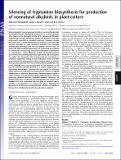Silencing of tryptamine biosynthesis for production of nonnatural alkaloids in plant culture
Author(s)
O'Connor, Sarah Ellen; Maresh, Justin J.; Runguphan, Weerawat
DownloadRunguphan-2009-Silencing of tryptam.pdf (1.160Mb)
PUBLISHER_POLICY
Publisher Policy
Article is made available in accordance with the publisher's policy and may be subject to US copyright law. Please refer to the publisher's site for terms of use.
Terms of use
Metadata
Show full item recordAbstract
Natural products have long served as both a source and inspiration for pharmaceuticals. Modifying the structure of a natural product often improves the biological activity of the compound. Metabolic engineering strategies to ferment “unnatural” products have been enormously successful in microbial organisms. However, despite the importance of plant derived natural products, metabolic engineering strategies to yield unnatural products from complex, lengthy plant pathways have not been widely explored. Here, we show that RNA mediated suppression of tryptamine biosynthesis in Catharanthus roseus hairy root culture eliminates all production of monoterpene indole alkaloids, a class of natural products derived from two starting substrates, tryptamine and secologanin. To exploit this chemically silent background, we introduced an unnatural tryptamine analog to the production media and demonstrated that the silenced plant culture could produce a variety of novel products derived from this unnatural starting substrate. The novel alkaloids were not contaminated by the presence of the natural alkaloids normally present in C. roseus. Suppression of tryptamine biosynthesis therefore did not appear to adversely affect expression of downstream biosynthetic enzymes. Targeted suppression of substrate biosynthesis therefore appears to be a viable strategy for programming a plant alkaloid pathway to more effectively produce desirable unnatural products. Moreover, although tryptamine is widely found among plants, this silenced line demonstrates that tryptamine does not play an essential role in growth or development in C. roseus root culture. Silencing the biosynthesis of an early starting substrate enhances our ability to harness the rich diversity of plant based natural products.
Date issued
2009-08Department
Massachusetts Institute of Technology. Department of ChemistryJournal
Proceedings of the National Academy of Sciences of the United States of America
Publisher
United States National Academy of Sciences
Citation
Runguphan, Weerawat, Justin J Maresh, and Sarah E O'Connor. “Silencing of tryptamine biosynthesis for production of nonnatural alkaloids in plant culture.” Proceedings of the National Academy of Sciences 106.33 (2009): 13673-13678. © 2009 National Academy of Sciences
Version: Final published version
ISSN
1091-6490
0027-8424